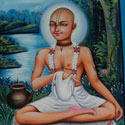Vilapkusmanjali
-
A Bouquet of Prayers - Mathura - 1993

A devotee may come to me, he may come to you, to others in this room, or to others not present here. There are so many devotees; it is not necessarily that he will come to me. The subject matters he discusses will be according to the amount of mercy he receives. There are several types of devotees. Devotees are not in one grade; there are so many various grades of devotees, and according to their grade they will come to you, to him, or to others. It depends on Krsna and the spiritual master...
-
Srila Sanatana Gosvami - Vilap Kusmanjali Verse 6

I take shelter of my lord and master, Sri Sanatana Gosvami, who is an ocean of compassion and who always feels sorry for the suffering of others. Although I was unwilling and blinded by ignorance, he diligently made me drink the nectar of devotion laced with renunciation.
-
The Goal - Vilap-kusumanjali

In this world we have a guru and we are his disciples, but in raganuga-bhakti (internally) the guru is like a friend. Visrambhena gurau seva. In the spiritual realm, there is no formal relation of guru and disciple as there is in this world. Srila Raghunatha dasa Gosvami used to address Srila Rupa Gosvami as guru, and he respected him as such. Inwardly, however, he saw him as a sakhi, as Rupa-manjari, as he will further reveal in the third verse...
-
Vilap-kusmanjali - Verse 6

I take shelter of my lord and master, Sri Sanatana Gosvami, who is an ocean of compassion and who always feels sorry for the suffering of others. Although I was unwilling and blinded by ignorance, he diligently made me drink the nectar of devotion laced with renunciation...
-
Vilap-kusmanjali - Verse Seven

There are two kinds of bhajana. The first is in vipralambha-lila, and that is performed by chanting and remembering the pastimes of separation. The second is in sambhoga-lila, and it is performed by remembering the pastimes of meeting.





